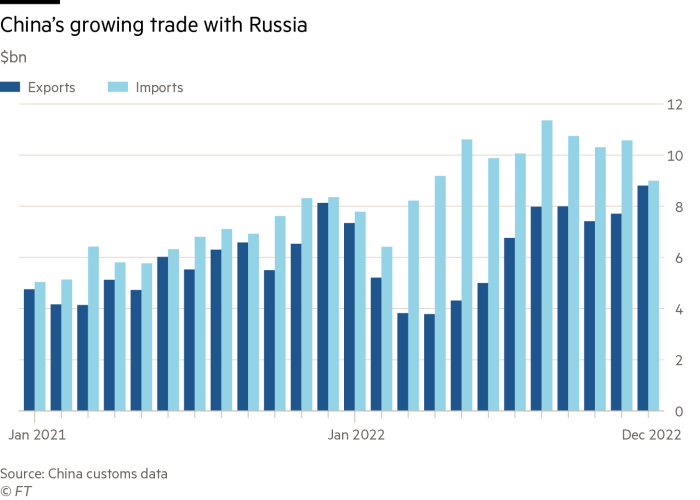On the first anniversary of Russia’s full-scale invasion, China has called for a ceasefire and a return to talks in Ukraine as Beijing tries to position itself as a peacemaker in the conflict.
However, Western leaders immediately questioned China’s intentions, accusing Beijing of already taking Russia’s side in the war.
China’s Foreign Ministry issued a 12-point statement on Friday outlining its position on a “political solution” to the war, although many of the measures reiterated Beijing’s previous talking points.
Chinese diplomats have been engaged in a difficult balancing act over the war, seeking to appear neutral despite Beijing’s close ties to Moscow, while blaming Washington and NATO for fueling the conflict.
“Talk and negotiation are the only viable solutions to the Ukraine crisis,” the Foreign Ministry said in the document, which was not directly described as a war. “All efforts conducive to a peaceful resolution of the crisis should be encouraged.”
The heads of NATO and the European Commission said the proposal was tainted by Beijing’s failure to condemn Russia’s invasion.
“Of course we will look at the policies, but we will look at them against the background that China has taken a side,” said Commission President Ursula van der Leyen. “This is not a peace plan.”
NATO Secretary General Jens Stoltenberg said: “China does not have much credibility because it cannot condemn its illegal occupation of Ukraine.”
But German President Frank-Walter Steinmeier said: “We very much welcome any constructive proposal that brings us closer to a fair and just peace.” He called on Beijing to engage with Kyiv and Moscow.
Beijing’s cease-fire plan is unlikely to gain support in Kyiv until Russia withdraws from areas it occupies, which is not mentioned in the 12-point manifesto.
The charge d’affaires of Ukraine’s embassy in Beijing, Zhanna Leshshinska, ruled out a ceasefire that would freeze the conflict on the current front line.
“Our view is that Russia should withdraw all its forces from the territory of Ukraine unconditionally,” he told reporters in Beijing on Friday, referring to the country’s internationally recognized borders, which include Crimea.
Leshshinska said China must prove its neutrality by getting Russia to withdraw its troops and increase engagement with Ukraine. Chinese President Xi Jinping did not invite Ukrainian President Volodymyr Zelensky after Russia’s invasion, but spoke several times with Russian President Vladimir Putin.

Shi Yinhong, a professor at Renmin University, said Beijing may have known that neither side would heed its proposal. “China feels [it] “It is necessary at this moment to reiterate its neutrality in the war, not only to criticize NATO, but also to save some international influence by distinguishing itself from Russia’s behavior,” he said.
When Wang Yi, China’s top diplomat, met with Putin on Wednesday, he made little progress in presenting the proposals.
Beijing’s newspaper warned against using nuclear weapons in war and called for Ukraine’s nuclear power plants to be protected. UN It demanded an end to sanctions not approved by the Security Council and a reference to sanctions imposed by Western countries.
Lily McElwee, a China expert at the Center for Strategic and International Studies, said the position statement aimed to convince Europe that Beijing could play a constructive role in the conflict while maintaining its partnership with Russia. A third objective may be to justify the countries of the “Global South”, many of which do not share the Western view of the war.
“China fears the international environment is sour for its global ambitions and it sees the Global South as a useful partner,” McElwee said.
The peace proposal follows Washington’s accusations that Beijing is considering sending weapons and other lethal aid to Russia.
Stoltenberg said there are “signs and indications that China is planning and considering providing military aid to Russia” but no evidence that it has yet done so.
Chinese Foreign Ministry spokesman Wang Wenbin said Beijing “does not grant any arms deals to any conflict zones or warring parties. What we are doing is promoting peace talks”.
Hu Xijin, former editor of the nationalist Chinese newspaper Global Times, supported Beijing’s reluctance to provide direct military aid.
China has already provided “tremendous support to Russia’s sanctioned economy” by increasing energy and food imports and maintaining the flow of Chinese “electronics, cars and microprocessors,” Hu said this week.
Chinese customs data showed imports from its neighbor rose 43 percent to $114 billion, while exports rose 13 percent to $76 billion.
Additional reporting by Maiqi Ding and Nian Liu in Beijing